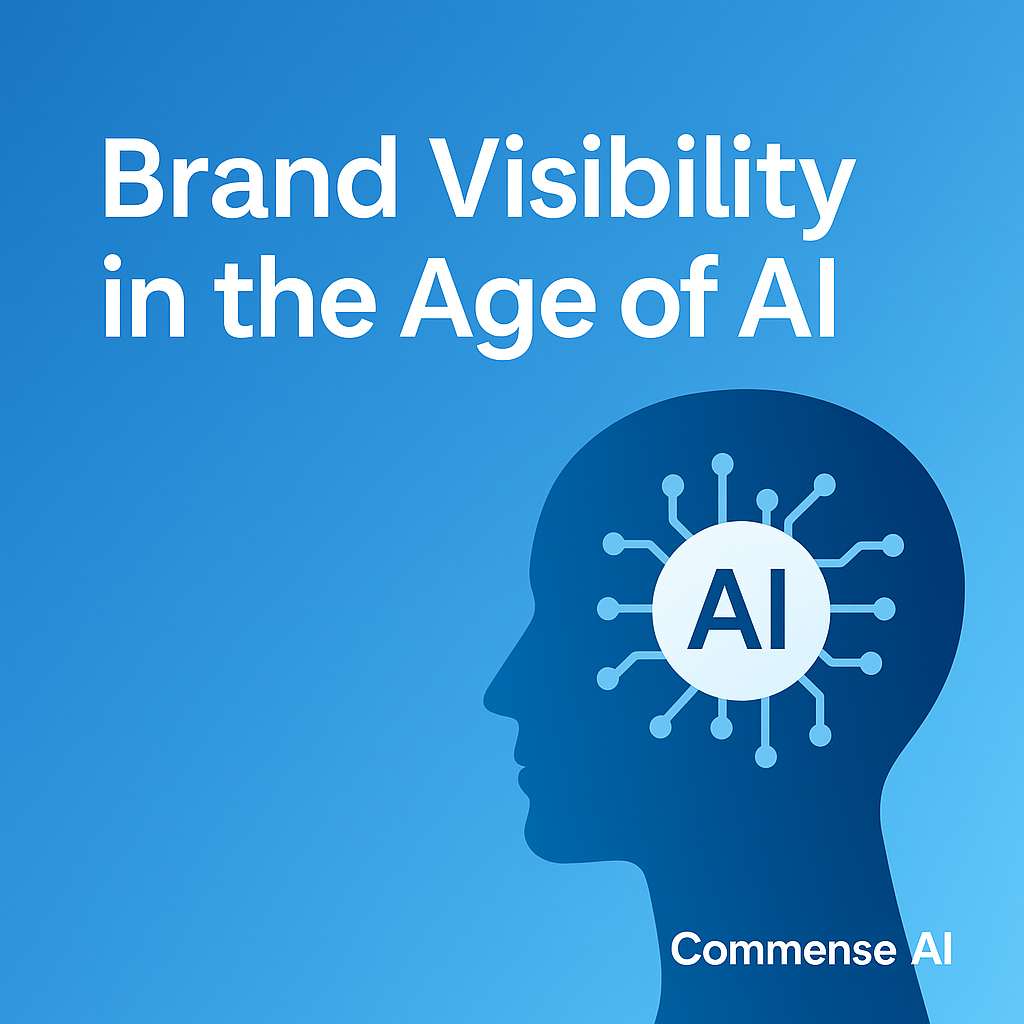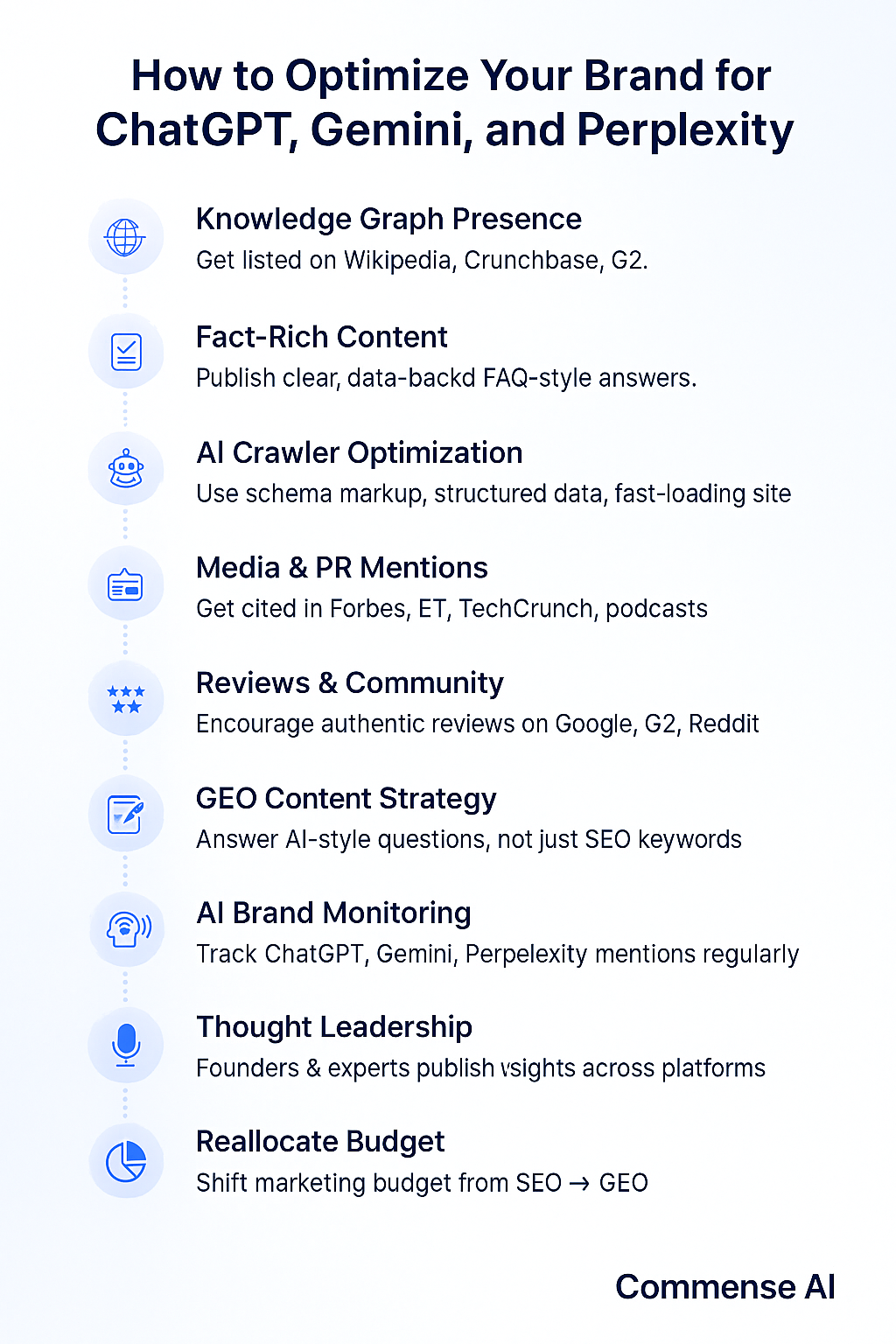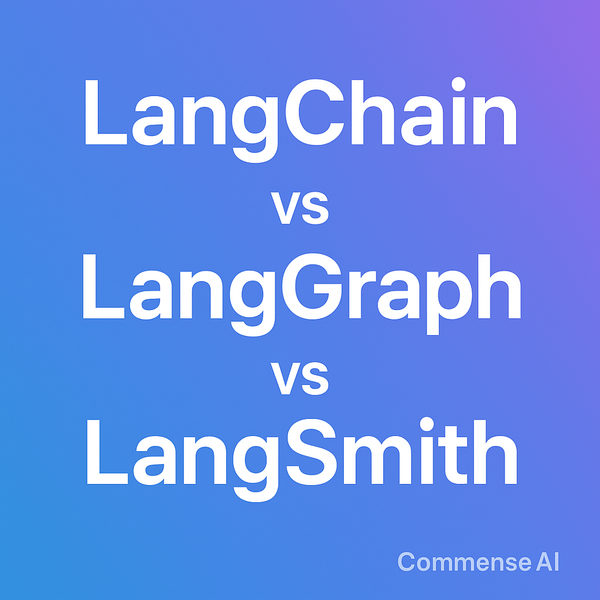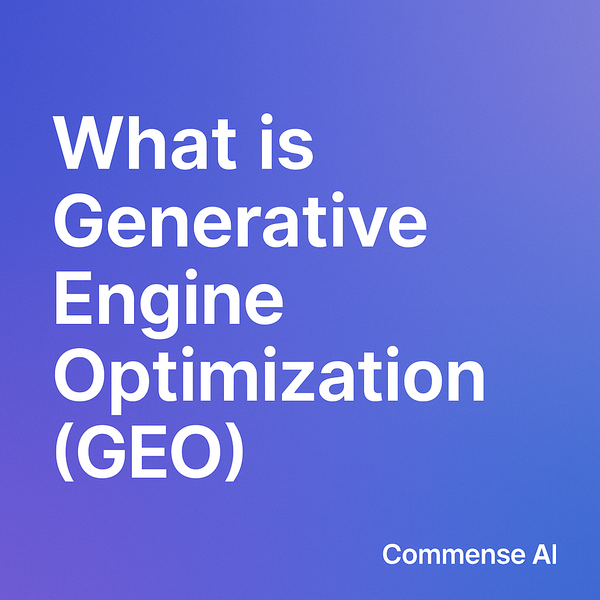Brand Visibility in the Age of AI
The future of search is shifting from Google’s blue links to AI-generated answers. Platforms like ChatGPT, Gemini, and Perplexity are becoming the new gatekeepers of brand visibility.

For the last 20 years, digital marketing revolved around one big question: “How do we rank higher on Google?”
Marketers spent millions on Search Engine Optimization (SEO) — optimizing websites with the right keywords, backlinks, and technical structures so that search engines could discover and rank them. But the world of search is changing fast.
Today, more and more people are asking ChatGPT, Google Gemini, and Perplexity AI instead of searching Google. Instead of scrolling through 10 blue links, they want direct, conversational answers.
This shift is creating a new discipline called Generative Engine Optimization (GEO). GEO is about making sure AI chatbots and LLM-powered search engines mention your brand when they give answers.
In this article, we’ll explain:
- Why ChatGPT, Gemini, and Perplexity matter for your brand.
- The difference between SEO and GEO.
- Practical steps to optimize your brand for AI-driven platforms.
- How companies can adapt strategies and roadmaps to include GEO.
- The future of brand discoverability in the AI era.
Let’s dive in.
Why AI Platforms Are the New Gatekeepers
The Rise of AI Assistants
Consumers are no longer relying only on Google search. They ask:
- “Which is the best coffee brand in India?”
- “What credit card is best for travel rewards?”
- “Give me a 7-day meal plan for diabetes.”
Instead of browsing blogs or comparison sites, they get summarized answers from ChatGPT, Gemini, or Perplexity. These platforms don’t just show results — they recommend products and brands directly in their answers.
Why This Matters for Brands
- If your brand is mentioned positively, you gain trust instantly.
- If you are absent, your competitors get the visibility.
- If you are misrepresented, your reputation suffers.
In short: AI answers = the new “front page of Google.”
SEO vs. GEO
Traditional SEO is about ranking web pages on Google. GEO is about being included in AI-generated answers.
| Aspect | SEO (Search Engine Optimization) | GEO (Generative Engine Optimization) |
|---|---|---|
| Platform | Google, Bing, Yahoo | ChatGPT, Gemini, Perplexity, Claude |
| Content format | Keywords, backlinks, on-page SEO | Structured data, verified facts, contextual mentions |
| User behavior | Clicks multiple links, compares results | Reads one summarized answer |
| Goal | Higher ranking, more clicks | Inclusion in LLM answers, trusted recommendation |
| Strategy | Blogs, backlinks, site optimization | Fact-rich content, brand authority, AI training visibility |
Key insight: In GEO, there are fewer spots to “win.” An LLM might only mention 3–5 brands in an answer. That makes competition fiercer and higher stakes.
How to Optimize for ChatGPT, Gemini, and Perplexity
1. Strengthen Your Knowledge Graph Presence
LLMs rely heavily on structured data from trusted sources like Wikipedia, Wikidata, LinkedIn, Crunchbase, Google Knowledge Graph, and press articles.
Action steps:
- Create or update your Wikipedia page if your brand qualifies.
- Get listed in Crunchbase, G2, Capterra, and other industry directories.
- Ensure your company details are consistent across the web.
This way, when ChatGPT or Gemini “pulls” facts, your brand is included.
2. Publish Fact-Rich, Authoritative Content
AI models prefer content that is data-backed and factual, not just marketing fluff.
Action steps:
- Write clear, FAQ-style content answering questions people actually ask.
- Include statistics, comparisons, and case studies that LLMs can cite.
- Avoid jargon — LLMs reward clarity and context.
Example: Instead of writing “Our tire brand is the best in India”, write “Apollo Tyres was ranked #1 in India for mid-size SUVs by XYZ Survey 2024.”
3. Optimize for AI Crawlers and RAG Systems
Perplexity and Gemini actively crawl the web to fetch real-time answers (unlike ChatGPT, which relies more on its training data + browsing plugin).
Action steps:
- Use schema markup (structured data) on your site.
- Ensure fast loading and mobile-first indexing.
- Publish fresh content regularly — Perplexity loves up-to-date sources.
4. Get Cited in Media and Thought Leadership
LLMs love citing reputable publications. A mention in Forbes, TechCrunch, or The Economic Times is worth more than dozens of blog backlinks.
Action steps:
- Run PR campaigns to land media coverage.
- Publish guest articles in industry blogs.
- Speak at webinars, podcasts, and conferences that get indexed.
5. Leverage Reviews and User-Generated Content
Perplexity often cites Reddit, Quora, Amazon reviews, G2 reviews, etc. Gemini is deeply integrated with Google reviews.
Action steps:
- Encourage customers to leave authentic, detailed reviews.
- Monitor Reddit and Quora for discussions about your brand.
- Engage with your community transparently.
6. Build a GEO-Friendly Content Strategy
Instead of just chasing SEO keywords, focus on AI questions (prompts).
Example:
- SEO keyword: “Best smartphones under 30,000 in India”
- GEO prompt: “Which smartphones under 30k are recommended for gaming in India?”
Action steps:
- Identify top queries people ask AI (use tools like AlsoAsked, Perplexity search trends, and Reddit).
- Write content directly answering those prompts.
- Structure answers with clarity, bullet points, and comparisons.
7. Monitor Your Brand Mentions in AI
Just as we monitor Google rankings, GEO requires tracking how often your brand is cited by ChatGPT, Gemini, and Perplexity.
Steps:
- Regularly test prompts like “Best AI consulting companies in India” and see if your brand shows up.
- Use LLM monitoring tools (emerging SaaS platforms are offering this).
- Adjust your strategy if competitors dominate.
8. Authority Through Thought Leadership
AI engines weigh expert voices. If your founder or CXO is a known thought leader, the brand gets stronger mentions.
Steps:
- Post insights on LinkedIn, Medium, Ghost blogs, Substack.
- Get quoted in research papers, podcasts, and AI discussions.
- Build a personal brand alongside the company brand.
Summary:

How Companies Should Adapt Their Strategies
1. Shift Budget from Pure SEO to GEO
Instead of spending everything on Google ads and SEO blogs, brands should allocate budget to GEO tactics:
- Structured data optimization.
- PR and authoritative publications.
- Monitoring AI brand mentions.
2. Redesign Content Calendars
Traditional SEO calendars revolve around keyword volumes. GEO calendars should revolve around:
- Top questions people ask LLMs.
- Trending AI search queries (e.g., “Which EV is most reliable in India 2025?”).
- Comparisons (best vs. alternatives).
3. Build a GEO Taskforce
Forward-thinking companies will create “AI Visibility Teams” whose role is:
- Tracking mentions in ChatGPT, Gemini, Perplexity.
- Identifying gaps where competitors are cited.
- Publishing content targeted at those gaps.
4. GEO as Part of Marketing Roadmap
Instead of being an afterthought, GEO must be a pillar in digital strategy, just like SEO, SEM, and Social Media.
Your roadmap should include:
- Quarterly audits of AI mentions.
- Partnerships with AI knowledge sources (directories, databases).
- AI-optimized press releases.
Case Studies (Illustrative Examples)
Example 1: Coffee Brand in India
- SEO approach: Write blogs like “Top 5 coffee brands in India.”
- GEO approach: Ensure ChatGPT, Gemini, and Perplexity mention your brand when asked “Which coffee brand is most trusted in India?” by:
- Getting cited in news articles.
- Having strong reviews on Amazon and Zomato.
- Publishing factual comparisons like “X% of Indian cafes use our beans.”
Example 2: Fintech Startup
- SEO approach: Optimize for “best business credit cards India.”
- GEO approach: Make sure Gemini mentions your product when users ask “Which credit card is best for small business travel?” by:
- Getting listed on financial portals.
- Ensuring Wikipedia/Crunchbase entries are updated.
- Getting press coverage in Moneycontrol or Economic Times.
Example 3: SaaS Software
- SEO approach: Target “top CRM tools for SMBs.”
- GEO approach: When Perplexity is asked “Which CRM tools are easiest for startups?”, your SaaS must appear via:
- Verified G2 reviews.
- Thought leadership articles.
- User case studies.
Challenges and Pitfalls
- Black box problem: LLMs don’t always reveal sources. Hard to track why a brand was included/excluded.
- Bias risk: AI might favor bigger brands with more digital presence.
- Constant evolution: AI models update frequently, so strategies must stay agile.
The Future of GEO
- AI brand monitoring tools will become as common as SEO analytics.
- LLM training data partnerships (brands may directly provide verified data to AI companies).
- Voice AI optimization (being cited when people ask Alexa, Siri, or Google Assistant).
- Regulations: Governments may push for transparency in AI citations.
Conclusion
The future of digital visibility is no longer about just ranking on Google. It’s about being trusted and mentioned by AI assistants like ChatGPT, Gemini, and Perplexity.
Companies must evolve from SEO to GEO — from chasing backlinks to building authority, clarity, and factual presence across the web.
The winners will be those who adapt early, build brand authority, and embed GEO into their marketing roadmap.
If SEO was about “being found,” GEO is about “being trusted.”




